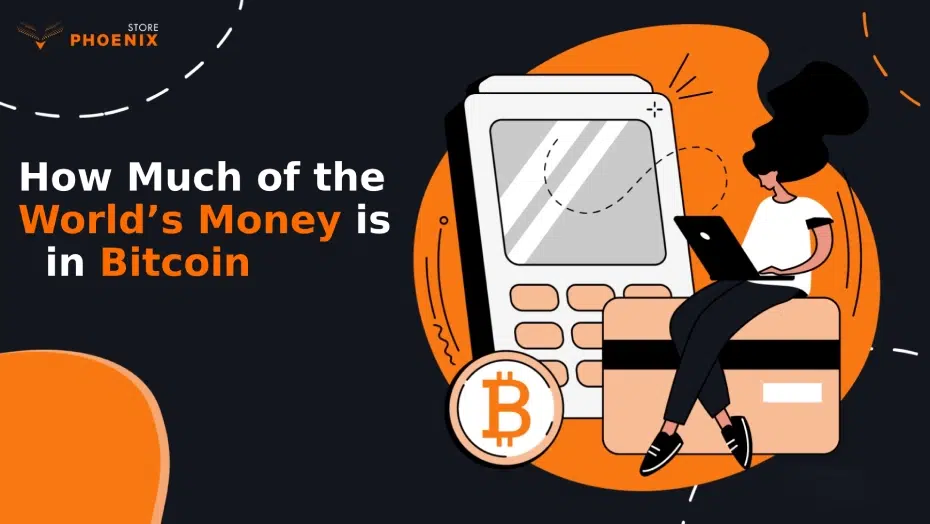How Much of the World’s Money is in Bitcoin?

As of 2025, Bitcoin’s market capitalization has exceeded $1 trillion, positioning it among the top global assets. Despite its volatile price movements, Bitcoin continues to grow as a significant part of the world’s financial landscape. But how much of the world’s money is in Bitcoin?
This question goes beyond market cap—it touches on the broader implications of Bitcoin’s adoption, its role as a store of value, and its potential to reshape traditional financial systems. In this blog, we will explore Bitcoin’s rise, its impact on the global economy, and what the future holds for this digital asset.
Understanding Bitcoin
Bitcoin is a decentralized digital currency that operates without a central bank or government. It relies on blockchain technology – a secure, transparent ledger maintained by a global network of computers. Unlike traditional currencies, Bitcoin has a fixed supply of 21 million coins, making it scarce by design.
Key Statistics About Bitcoin Ownership
Bitcoin adoption has surged in recent years, but who exactly owns it—and how much? This section breaks down the latest data on global Bitcoin ownership, from demographics to distribution and economic influences.
1- Global Bitcoin Ownership Trends
As of 2024, approximately 560 million individuals worldwide own cryptocurrencies, representing about 6.8% of the global population. Notably, India leads in Bitcoin adoption with 75 million users, followed by China with 38 million, and the United States with 28 million owners.
2- Demographics of Bitcoin Investors
The demographic profile of Bitcoin investors is predominantly male (61%), with females accounting for 39%. The largest age group among cryptocurrency owners is 25-34 years old, comprising 34% of the market, followed by individuals aged 35-44 at 31%.
3- How Many People Own Bitcoin?
Approximately 106 million people globally own at least a fraction of Bitcoin. In the United States, about 28% of American adults, equating to roughly 65 million individuals, own cryptocurrencies as of 2025.
4- Regional Distribution of Bitcoin Ownership
Bitcoin ownership varies significantly by region. Brazil and Indonesia both report that 41% of their populations own cryptocurrency. Additionally, South America has experienced a 116.5% growth in crypto ownership since 2023, with Argentina leading in the region.
5- Average Bitcoin Holdings per Investor
While exact figures on average Bitcoin holdings per investor are challenging to determine, data indicates that the top four wealthiest Bitcoin addresses collectively own over 663,306 BTC. This concentration suggests a significant disparity in Bitcoin distribution among holders.
6- Bitcoin Ownership by Age Group
Cryptocurrency ownership spans various age groups. In 2025, Generation Z (aged 18-27) leads with 42.3% ownership, followed by Millennials (aged 28-43) at 37.4%. Generation X (aged 44-60) accounts for 16.3%, while individuals above 60 years old represent 4.0% of owners.
7- Impact of Economic Factors on Bitcoin Ownership
Economic instability and inflation have driven increased interest in cryptocurrencies as a hedge against financial uncertainty. This trend is particularly evident in regions experiencing economic challenges, where individuals seek alternative stores of value.
These statistics underscore the evolving landscape of Bitcoin ownership, highlighting its growing global adoption and the diverse demographic profiles of its investors.
The Role of Bitcoin in the Global Economy
Bitcoin’s influence on the global economy has expanded significantly, evolving from a niche digital currency to a recognized asset class. This section explores Bitcoin’s role as a digital asset, its comparison to traditional assets like gold, and its growing acceptance worldwide.
Bitcoin as a Digital Asset
Bitcoin operates as a decentralized digital currency, utilizing blockchain technology to enable secure, transparent, and borderless transactions. Its fixed supply of 21 million coins positions it as a scarce asset, often likened to “digital gold.” This scarcity, combined with its decentralized nature, has led investors to view Bitcoin as a hedge against inflation and economic uncertainty.
Comparing Bitcoin to Gold and Other Assets
Both Bitcoin and gold are considered “hard money” due to their scarcity and potential to preserve value. Gold has a long-standing history as a safe-haven asset during geopolitical turmoil. Bitcoin, while more volatile, offers advantages in portability and divisibility, allowing for quick, borderless transactions. However, gold’s lower volatility provides steady returns, particularly in times of economic stress, making it a more conservative choice.
The Growing Acceptance of Bitcoin
Bitcoin’s acceptance has surged, with increased institutional adoption and favorable regulatory developments. The approval of Bitcoin ETFs and the establishment of strategic Bitcoin reserves by governments underscore its integration into the financial system. For instance, the U.S. government’s creation of a Strategic Bitcoin Reserve highlights its recognition of Bitcoin’s strategic importance. Additionally, major corporations and financial institutions are incorporating Bitcoin into their portfolios, reflecting its growing legitimacy as an asset class.
Thinking about joining the Bitcoin economy yourself? Before diving in, it’s smart to understand your potential returns. Use this Bitcoin mining profitability calculator to estimate how much you could earn based on your hardware, electricity costs, and market conditions.
How Much Money Is in Bitcoin Today?
As of April 9, 2025, Bitcoin’s total market capitalization stands at approximately $1.52 trillion, with each BTC trading around $76,392 (bittimexchange). This valuation places Bitcoin among the world’s most valuable financial assets, ahead of most national currencies and rivaling large-cap tech stocks.
The Impact of Bitcoin on Traditional Financial Systems
Bitcoin, as a decentralized digital currency, has introduced significant challenges and considerations for traditional financial systems. Its influence extends from altering perceptions of money to prompting institutional responses.
Bitcoin vs. Centralized Banking
Traditional banks operate within centralized frameworks, adhering to regulatory oversight and providing services like savings accounts, loans, and payment processing. In contrast, Bitcoin functions on a decentralized network, enabling peer-to-peer transactions without intermediaries. This fundamental difference raises questions about control, transparency, and the role of financial institutions. While centralized banking offers consumer protections and stability, Bitcoin provides an alternative that some view as a hedge against inflation and governmental monetary policies.
How Bitcoin Challenges Traditional Currencies
Bitcoin’s volatility presents challenges for its use as a stable medium of exchange. Unlike traditional fiat currencies, which are subject to central bank policies aimed at controlling inflation and ensuring economic stability, Bitcoin’s value can fluctuate dramatically. This volatility can limit its effectiveness for everyday transactions and as a store of value. Additionally, Bitcoin’s decentralized nature means it operates outside the direct control of governments and central banks, potentially undermining traditional monetary systems.
Bitcoin Future Predictions
Bitcoin’s future holds significant promise, with varying predictions about its price and impact.
- Price Forecasts: Experts predict that Bitcoin could reach anywhere between $200,000 and $250,000 by 2025, driven by increasing institutional adoption and favorable regulations.
- Institutional Adoption: As more financial institutions include Bitcoin in their portfolios, its price is expected to rise significantly due to growing demand.
- Regulatory Landscape: Developments such as the approval of Bitcoin ETFs and government reserves highlight Bitcoin’s expanding role in the global financial system, despite its ongoing volatility.
While Bitcoin shows great potential, its future will be shaped by volatility and regulatory changes. If you’re thinking about Bitcoin mining, explore Bitcoin Mining Hosting Services at Phoenix store to optimize your returns.
Conclusion
Bitcoin’s impact on the global economy is undeniable, from its role as a digital asset to its challenges to traditional financial systems. As its adoption continues to grow, Bitcoin’s price predictions for 2025 remain optimistic, though volatility and regulation will play a key role in shaping its future.
For those interested in tapping into Bitcoin mining, exploring opportunities like Bitcoin mining in Dubai could be a lucrative move, offering specialized solutions to maximize your mining efforts. Phoenix store is a great option to buy Whatsminer in Dubai or also Antminer. Get a free consultation by calling +971 4 327 1145.”
 How to send Bitcoin to another wallet?
How to send Bitcoin to another wallet?
 »
»